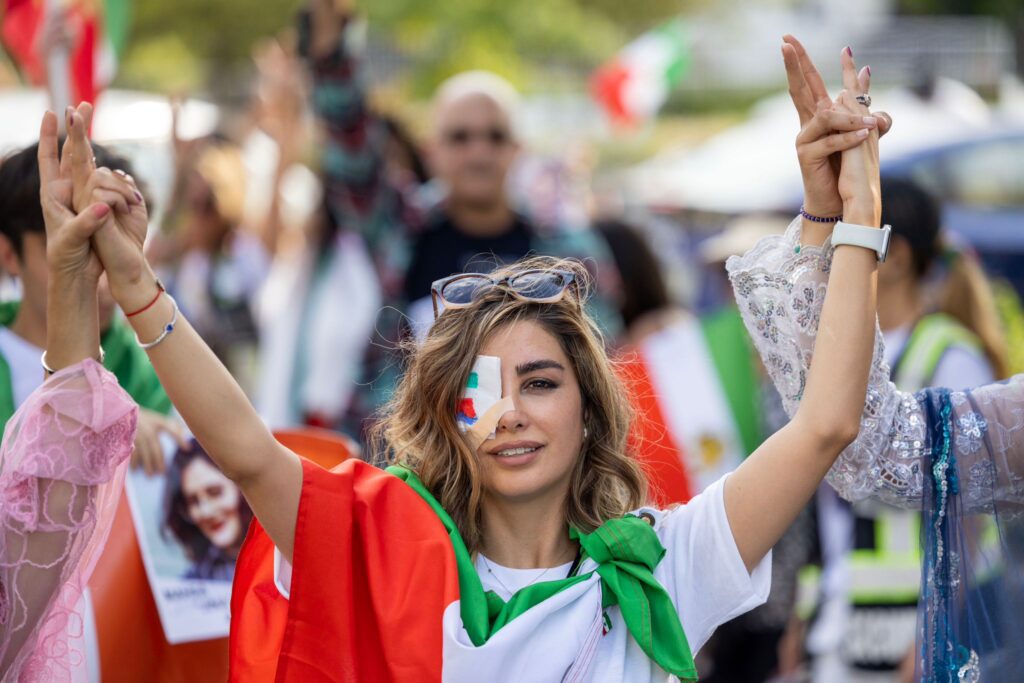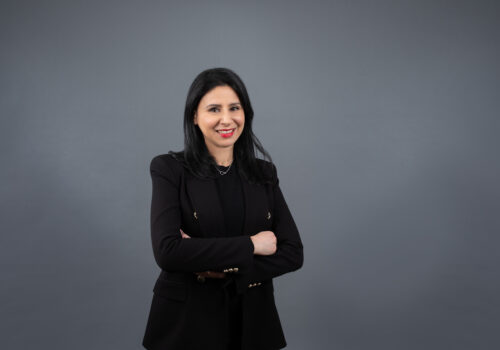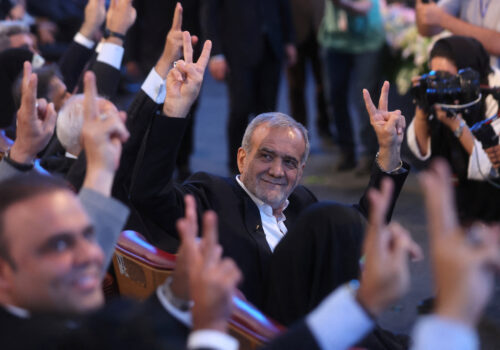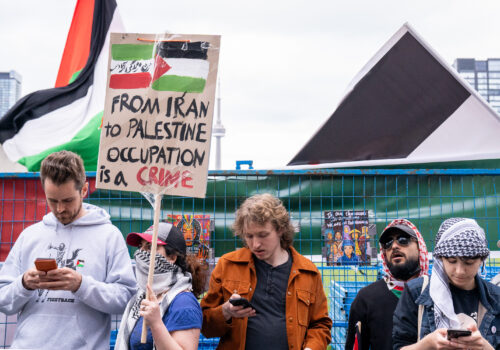Elahe Tavakolian is an Iranian activist who gained international recognition for her courageous protests against the Islamic Republic—a stand that cost her an eye when security forces systemically shot her during the 2022 Women, Life, Freedom uprising. As a PhD student, Tavakolian joined the nationwide anti-regime protests sparked by outrage over the murder of Mahsa Amini at the hands of the so-called morality police.
Denied medical treatment in Iran due to her activism on social media in support of the protestors, Tavakolian left the country to seek treatment in Italy. There she was fitted with a prosthetic eye and has undergone numerous surgeries. In exile, she has become a recognized voice for the Women, Life, Freedom movement, advocating for justice for victims of the Islamic Republic. In 2023, her efforts were honored with the Fondazione Minerva’s Women in the World for Human Rights award.
Former Atlantic Council nonresident senior fellow Holly Dagres had the pleasure of sitting down with Tavakolian to share her story and discuss the situation in Iran and what the West needs to do.
SIGN UP FOR THIS WEEK IN THE MIDEAST NEWSLETTER
IRAN SOURCE: Can you retell what happened the night you were shot by security forces in September 2022?
ELAHE TAVAKOLIAN: I was in Mashhad when Mahsa Amini was killed. All of Iran was angry and upset. I was one of those Iranians. It was a bad scene, and the news was painful. Because of the mandatory hijab, a girl would be murdered. And she was a guest in the city of Tehran; our girl was Kurdish—our Mahsa Jina.
When I found out, I was very upset and felt as if she was my sister. I felt with all my existence how mercilessly they killed her. For two nights, I was in the streets of the city of Mashhad. We would chant and I was with my kids and my friends. My family was in Esfarayen [at the time].
Well, it was the end of summer, and my kids would need to go to school and needed supplies. I went to visit my family in Esfarayen. I went there and went into the street. That day, there was a nationwide call for a nationwide protest.
If you look up the city of Esfarayen in North Khorasan, it is very small. It has a total population of twenty to thirty thousand, and 90 percent of the people in that town are religious and traditional. It also has the largest number of martyrs and veterans—my own father is a veteran. It was really interesting. I saw with my own eyes that 70 percent of the people of Esfarayen were in the streets chanting. When a unity ring and crowd was formed with the chanters, I was in the main square. Suddenly, I saw the young people standing next to each other chanting, and I joined the crowd too.
I was with my kids and my younger sister, chanting. We were chanting “Women, Life, Freedom,” “Man, Homeland, Prosperity,” “Death to the dictator,” and “Death to the IRGC.” We didn’t set anything ablaze. We didn’t destroy property. We just chanted.
After I decided to join the crowds, my daughter asked me, “Why should we make chants?” She was a little scared, but my son said, “No, let’s go.” I said, “Because you should defend your rights. So that you learn that your lives should not be trampled by the regime, unlike my generation.”
When I was nine years old, my hair was very long and beautiful. I really loved it. Because of my age, I had to wear a chador and take part in school celebrations and they would take us to the mosque. Because my hair was long, I didn’t like to wear hijab. They forcibly cut my hair, so I made my first sacrifice at that age.
When I was older, I was forced to get married—I had an unsuccessful marriage. At that moment when I went to chant, it was my combined rage over the pain I had suffered and the rage I was experiencing over Mahsa’s killing. I put myself in the place of Mahsa. I could fully feel it. I felt so upset that, because of hijab rules, our girls are being imprisoned, raped, and killed. This was incomprehensible. We couldn’t forgive what happened.
That’s why I decided to chant at that moment. I didn’t want my daughter to be sacrificed like me. I didn’t want my daughter to stay silent for all her years. At that age, you need to yell for your rights and not let the regime force you to say what they want.
IRAN SOURCE: It’s now the second anniversary of the Women, Life, Freedom uprising. How do you feel?
ELAHE TAVAKOLIAN: Nowadays, other injured protesters and myself all have the same feeling. But I always say that every Iranian who was forced to leave Iran has suffered and was injured. Yes, we were physically injured—we lost our eyes, lost our hands, or even our feet. But every Iranian who was forced to leave has suffered enough.
Those of us who were shot, saw blood spilled on the ground. Our eyes came out and we saw the blood. It was a bad feeling. Every year when September approaches, it’s traumatic—it triggers panic. That moment comes to my memory and my eyes. [In the lead-up to the anniversary], I was feeling terrible. I was at home for a week. It was as if my eye could remember what had happened to me two years ago. Up until two years ago, both my eyes were healthy.
I still can’t look at my old photos because I get upset. I had two eyes and they were beautiful. I still say they are beautiful, but sometimes I miss them. It’s like you have lost someone dear to you. In these two years, I lived in pain and suffered a lot. In these two years, I’m bothered a lot. I’ve had a hard time.
When it’s the Mahsa Amini anniversary, it’s as if I can hear all the screams of the boys and girls in the street. Their yelling, “Women, Life, Freedom” rings in my ears. When they yelled in response, “Man, Homeland, Prosperity,” rings in my ears. “Death to the dictator” rings in my ears.
The moment I was shot during the crackdown, my children were screaming, “They killed our mother,” and nobody was helping. I could hear the screams of “Don’t be afraid, we’re all together” and I would just shout and yell, “I’m burning! I’m burning!”
Those moments replay over and over in my head. This is the trauma that I get every time the anniversary is near. It’s as if I’m back in that exact moment—I’d like to be back in Iran. I’d like to be back in that moment to yell—it’s as if I must take my rights back as if something is left back there. I still need to fight for it. I still haven’t finished my work. I feel like my job is incomplete. Whenever Mahsa’s anniversary arrives, I feel so much is left to do in the country.
IRAN SOURCE: Do you think the Iranian people will take back their rights and this regime will be gone?
ELAHE TAVAKOLIAN: Well, if we think that we are trying but aren’t getting an outcome, obviously we won’t get a good response. We need to spend a lot of time together, to build unity.
We shouldn’t stop. We must continue ahead on the path we’ve taken. There are difficulties in the way, including the cyber army that attacks us with their smear campaigns to create false divisions. These stop us from reaching our main goal. I might not have been a very political activist or speaker. Life and accidents have put me on this path. I was a protester and have now become a political and freedom-seeking protester and advocate, and a lawyer.
All Iranians are protesters, advocates, and political activists now because we don’t want the regime of the Islamic Republic. When [Iranians] rejected the regime, they have become political advocates. And I believe they must want it for union, for solidarity, to forge unity—and if they fight for what they want, why not? We will certainly see a positive result.
IRAN SOURCE: For those not familiar, can you explain why security forces systemically blinded protesters during the uprising?
ELAHE TAVAKOLIAN: According to a report, which was published by the Fact-Finding Mission on the Islamic Republic of Iran (FFMI), nearly 560 people reportedly lost an eye, or both of their eyes. This report included those who were able to publicize their cases and were verified. But many people in Iran are not able to talk or communicate about this issue because of the security conditions; they don’t have the financial resources and their families are still trapped there. If I want to ask about the main statistics, the rate would be more than a thousand people. But they have the right [to remain silent].
Security forces wanted to scare people. When I was in Iran, when I lost my eye, I quickly went to Mashhad because I had been living there for a few years. And there were security forces’ motorcycles everywhere. Every one hundred meters, there were twenty motorcyclists with batons, tear gas, and pellet guns, and I don’t know what else. They would rev their motorcycles and everyone would get scared and run away. Targeting our eyes had one goal, to sow fear. For people in the streets to see us and say, “What happened to you?” And for us to reply, “They shot and took our eyes out.” So that when the next protests happen, a mother, father, sister, or brother would not allow protesters in their home to join the demonstrations: “Don’t go out. See how they shot others? They will take your eye out.” For this reason, it made a lot of people scared. Fortunately, the current generation is utterly brave, fully aware, and not afraid; 50,000–60,000 have left Iran since and are still speaking up.
They did this so that the protesters would be silent and afraid to talk. But as you can see, the injured are trying to be a voice against the Islamic Republic and its crimes. The injured, wherever they are in the world, are talking about it and are living evidence of the Islamic Republic’s crimes. As long as they live, they would be questioned, “What happened to your eye?” “It was taken by the Islamic Republic.” “But why did they do it?” “Because we were protesting.” “Protesting for what?” “Because we wanted our rights and wanted freedom only.”
The regime didn’t think it would get a reaction like this. As you know, there are a lot of folks who are talking or spreading the news.
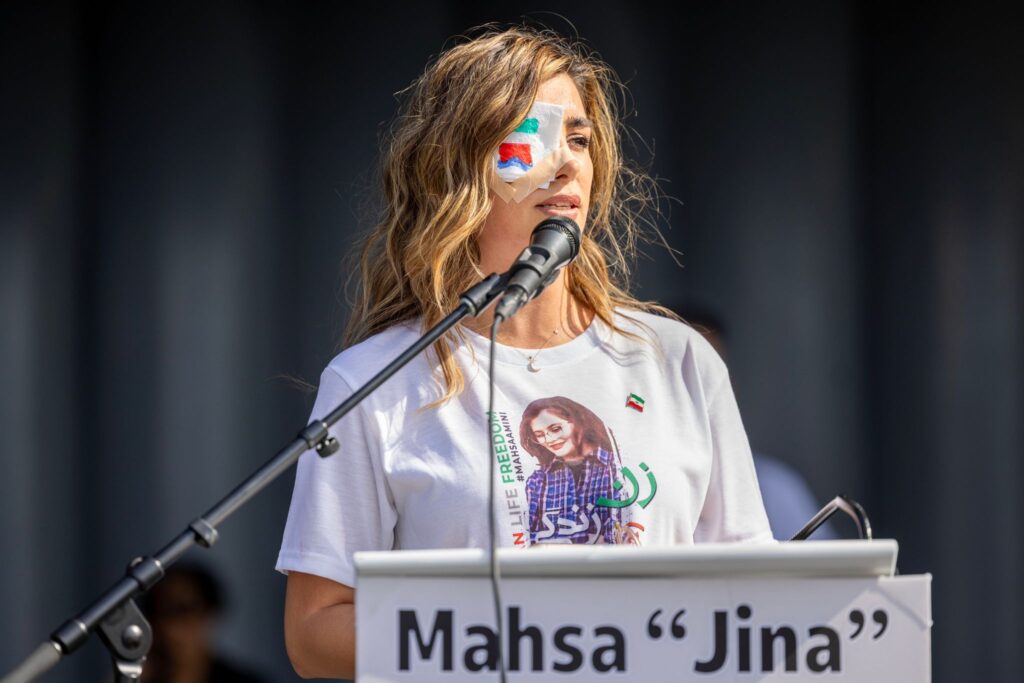
IRAN SOURCE: If you were right now sitting in front of the president of the United States, what would you like to say to him?
ELAHE TAVAKOLIAN: Well, when we were in Iran, everyone was watching television and social media. We expected instead of saying we condemn the actions, [that the United States would say] we stand on the side of the [Iranian] people.
Because we have only heard for forty-five years that “we condemn.” But we want [the United States] to be on the side of the people, not the Islamic Republic. They should know that the Islamic Republic is different from its people. They should know that the Islamic Republic is not representative of the people of Iran. If I am with the president, I will tell them, “You should not have relations with the Islamic Republic behind the curtain.”
Maybe my words are too harsh, but this is what comes out of the hearts of the people of Iran. We always say, that until the United States, the United Kingdom, and other world powers want it to, this regime will not fall. This is the truth and can’t be denied. All the hope of the people of Iran is inside Iran, but also in the Western governments because they are powerful.
They need to see, if I come and talk, that I took the risk. My family is in Iran. They may be under pressure; [the regime] may even create a plan against me. They may even force my family into giving false testimonies against me. But I risked it and came and talked, and I am ready to have face-to-face meetings and show and testify and demand that they stand by the people of Iran once and for all and turn their backs on the Islamic Republic.
IRAN SOURCE: What does the West not understand about the Islamic Republic?
ELAHE TAVAKOLIAN: If I want to talk about it frankly, I came from the heart of the people. I was apolitical. And they would say, “America just condemns but doesn’t do anything. On the sidelines it’s talking with the Islamic Republic, appeasing them and they are having relations with them, but giving the appearance of otherwise.” They [the West] say one day they want to sanction, the other day they don’t want to. My discussion isn’t about whether to sanction or not. The people of Iran have lost hope in the West.
This has been happening since 2009 when all these people were killed. In the following years, the same thing happened in 2017 and 2019. We lost so many lives. How long does this have to go on until the United States sees the true nature of the Islamic Republic?
For forty-five years, the United States has been pretending to be asleep. You can’t wake up someone who is pretending to be asleep. This is something that the Iranian people have understood. And they say, “Well, now our hope is inside Iran.” But they can’t. The Iranian people are empty-handed. The Iranian people give one chant and they end up in prison or they are executed or raped. A lot have been extrajudicially killed in silence. I was only able to come out because of medical issues and was able to talk. But a lot are there and unable to talk. Our athletes abroad are successful, they have given their lives for Iran, but they aren’t backed and they can’t. The people of Iran are really tired. Their backs are bent over.
I don’t understand what the United States and Western countries want to see that they haven’t seen already. All this killing, all this living evidence of the crimes of the regime. In Europe, in the United States, they can talk to every one of these Iranians. They can see that all of these folks were protesters. I was not political; I was with my children and family chanting. The United States doesn’t want to see it because it doesn’t serve its benefit. I feel it is not beneficial for the [Joe Biden] administration. So many have been killed, so many imprisoned. You see the official announcement of the executions from all around the world. Iran is more genocidal than anywhere else.
IRAN SOURCE: In one of our previous conversations, you said that the Iranians living abroad had brought a lot of hope to protesters. Can you talk more about that?
ELAHE TAVAKOLIAN: When we were in Iran in the streets, one foot was in the streets and the other foot was watching the media. We would come home quickly when we were no longer able to be on the streets. We turned on the cell phone and satellite, and we checked the channels one by one. Every night, I would tune into the channels and news to see what they were doing [in the West] to cover what happened over here.
When I saw that there were about 10,000–50,000 people in front of the consulates, embassies, in the streets, I would be with my friends and we’d all say, “This year it’s over, folks. Look, the Iranians over there have created a hailstorm of protest. This year [the regime is] over. Oh yes, our Iran will revive.” We were all thinking of freedom and thinking of much more. We were hopeful. When we became united, we became very hopeful. It was as if there was a spark of hope in the heart of each Iranian. Anytime we turned on the channels and saw our pictures—the injured, the killed—in the hands of Iranians abroad who hadn’t even met us, it would bring me joy. I would say, “This is the Iranian spirit. This is an army of thousands of people outside of Iran.”
I don’t know if it was because of the end of the unity or the coalition, or the division between unity, but the Islamic Republic cyber army infiltrated all the groups. If you’re with them you’re not with us. If you’re with us you’re not with them. You can’t be with them.
As a result, everyone became scattered. Now that I came here [to the West], I lost hope. I saw that apart from the fact that there is an Islamic Republic in Iran, there is also an Islamic Republic here. Unfortunately, this prevented us from reaching the goal. They have to focus on unity and protests because in Iran we only looked at what people were doing. Who are the voices of Iran? Who is active in Iran? We didn’t have hope because we couldn’t go under the bullets. We risked our lives but they didn’t let us. They oppressed protests, they killed, they arrested, they didn’t let us go. But after that, our hope was really for the diaspora.
We were always looking at it. Well, we were more hopeful when we saw diaspora protests. We said, “Look, guys, when the pressure of all these Iranians is on the Western governments, we will get a response.” This trend, instead of increasing, has become less and less and less. It’s really disturbing. But we shouldn’t lose hope because it takes time.
It is a long road, but it is not a goal we cannot reach. We will reach 100 percent if our goal is the collapse of the Islamic Republic. We must remove hurdles from our way. We must give hope to each other. We must participate in gatherings. You can participate in the gatherings with any political beliefs you may have. With any Iran flag you like. We have the lion and sun flag and that is all. And let’s stand by each other. Now, if someone says, “I have this belief or that.” That will be determined during democracy, during free elections, and a free ballot box. Each of us will have a single vote in a free election. But stand together. You cannot reach free and democratic elections by smearing me.
IRAN SOURCE: You mentioned the new generation of Iranians. What is the difference between them and the old generation?
ELAHE TAVAKOLIAN: The new generation is very aware. Now, it is the age of social media and cyberspace. The old generation came with newspapers and pamphlets at that time. They didn’t understand—they would say, “We saw [Ayatollah Ruhollah] Khomeini on the moon” and it’s laughable. I don’t know why they would believe such things.
And everyone came and said that they have a single leader. They were free, but they were not aware. But the current generation is very different. The current generation is aware, but they are not free. And now they want to be both aware and free to reach prosperity. This is the difference between the two generations.
Civil disobedience is still going on in Iran. Women go out without hijab, boys go with shorts, and many of our actors stand by the people. Our singers have sung songs for the [protesters], for the people of Iran, so many have stood by the people of Iran. Because they have come to a point where if you do not have the support of the people, you are not loved anymore. The Islamic Republic itself understands this. It understands that the people are aware. It understands that people don’t want it anymore. The reason it brought [President] Masoud Pezeshkian was because the system was crumbling. It needs a fake shock. Pezeshkian was brought to supposedly reform the new government and to work on it. However, he was a deception, and the cabinet ministers were chosen by the dictator, Supreme Leader Ayatollah Ali Khamenei.
IRAN SOURCE: You were once in Iran watching what Iranians abroad were doing. Now that you’re abroad, how can you help the people in Iran?
ELAHE TAVAKOLIAN: Well, when I left, I did a lot of interviews and met with a lot of people who were victims of state violence like me. I went to the United Nations, for the Nobel Peace Prize ceremony for Narges Mohammadi. I went and spoke at a lot of places. They are hearing the real story of Iran—not just from my lips, but from others who have left. However, the expectation that I and others like me had was not fulfilled because divisions were sowed. They say, “If you’re going to talk, you shouldn’t belong to this or that group.” But no one should be seen as a member of this or that group. We’re all for Iran. When we were in Iran, we participated in the protests just for freedom, for the people.
I didn’t realize that the person next to me was Turkish, Lor, or Kurdish, or something else. Or which party I’m with. We would just shout with one voice. But when I came out [of Iran], I realized that what’s inside Iran is very different from what’s outside. The people of Iran are here. Some groups are helping each other. They are trying hard to meet with policymakers, talk to the governments, and expose the Islamic Republic’s atrocities. But our hopes and expectations are much more than this.
We lost our eyes on this path. Let’s not lose sight of our goal over marginal issues. That would only make the Islamic Republic happy.
(Translated from Persian by Holly Dagres and Khosro Kalbasi)
Holly Dagres is a senior fellow at the Washington Institute. Follow her on X @hdagres
Further reading
Wed, Aug 21, 2024
Negah Angha: It’s crucial to understand and listen to diverse MENA voices
MENASource By Holly Dagres
The Iranian-American foreign policy and national security expert was interviewed by our MENASource editor to discuss her views on Middle East policy, social movements, and where the region is heading.
Fri, Jun 21, 2024
Don’t be fooled by the ‘reformist.’ Iran’s presidential election won’t bring fundamental change.
IranSource By Holly Dagres
The only way out of this conundrum is if Iranians take their destiny into their own hands.
Fri, May 10, 2024
The Islamic Republic claims to support US student protests, but it crushed its own student uprising
IranSource By
No matter what the state-run hardline outlets publish or broadcast in Iran, Iranians remember the domestic repression they’ve seen with their own eyes.
Image: Second-anniversary rally commemorating Mahsa Jina Amini, held in front of the Washington Monument in Washington, D.C., on September 15, 2024, organized by NSGIran (National Solidarity Group of Iran).
